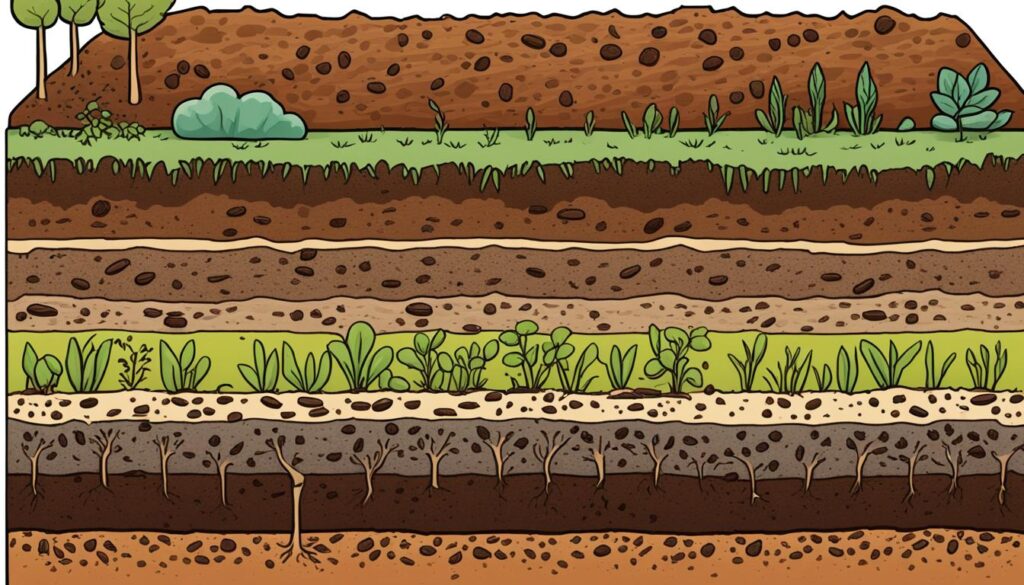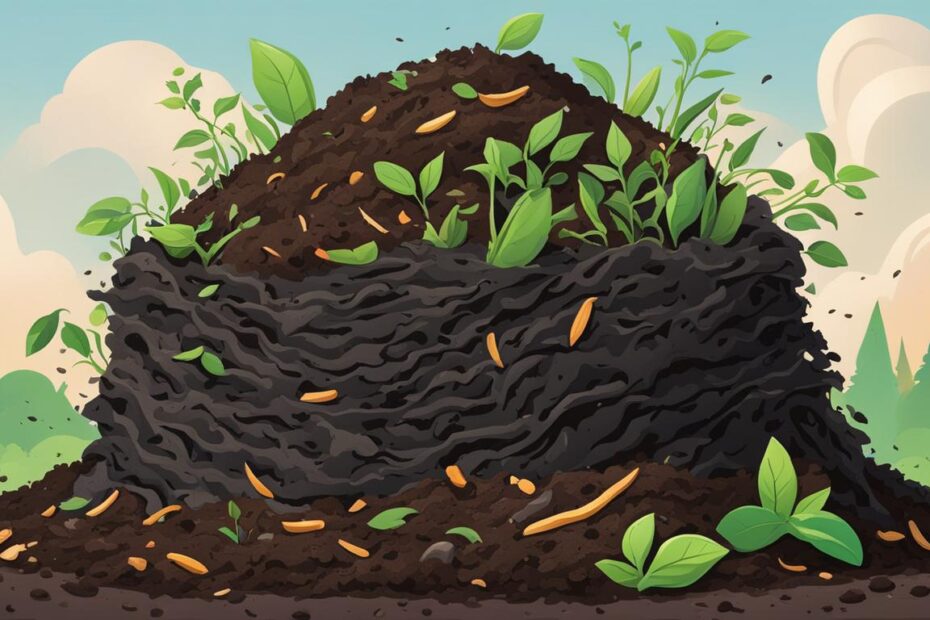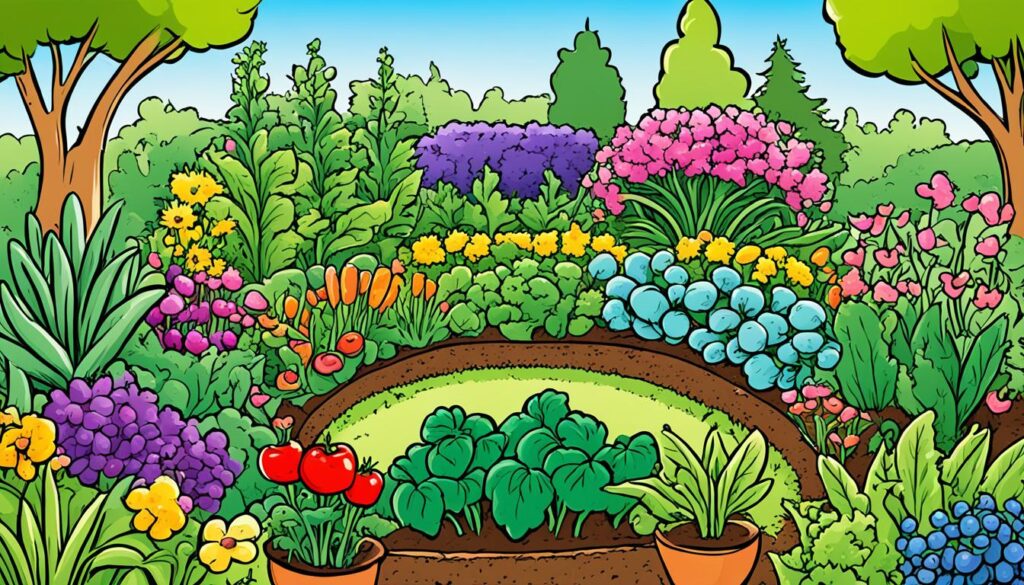Are you looking for a gardening solution that can transform your lackluster garden into a vibrant oasis? Say goodbye to soil problems and nutrient deficiencies with just 1 cubic yard of soil. But here’s the catch, not all soil is created equal. The secret lies in the magic of compost.
Unlike peat moss or other soil amendments, compost offers a holistic approach to gardening. It goes beyond addressing specific issues and nourishes your garden with a rich infusion of organic matter. Intrigued? Let’s explore how compost can unlock the true potential of your garden.
Key Takeaways:
- 1 cubic yard of compost can address challenging soil problems and nutrient deficiencies.
- Compost acts as a slow-release fertilizer, providing sustained nutrients for plant growth.
- Compost helps regulate pH levels, promotes beneficial microorganisms and insects, suppresses weeds, enhances root health, contributes to carbon sequestration, controls erosion, and improves soil structure.
- By adding compost to your garden, you can create a sustainable environment for plants to thrive.
- Compost offers additional benefits such as carbon sequestration, erosion control, improved soil structure, and water retention.
The Holistic Approach of Compost
Compost offers a holistic approach to soil management by enriching it with organic matter. It goes beyond addressing specific nutrient deficiencies and fosters a sustainable environment for plants to thrive. Compost replenishes essential nutrients, enhances the availability of nutrients in the soil, and acts as a slow-release fertilizer. It provides sustained nutrients for plant growth, promoting overall plant health and vigor.
When you incorporate compost into your soil management practices, you introduce a wealth of benefits that support the entire ecosystem of your garden. By enriching the soil with organic matter, compost acts as a natural source of plant nutrition. It infuses the soil with vital nutrients that are readily available for plants to uptake, ensuring optimal growth and development.
Furthermore, compost improves the soil’s ability to retain moisture, reducing the need for frequent watering and promoting water efficiency. This is especially advantageous in regions with limited water resources or during dry periods. Additionally, compost enhances soil structure, creating a favorable environment for root growth and improving the overall tilth of the soil.
The slow-release nature of compost ensures a continuous supply of nutrients to plants, supporting healthy growth throughout the growing season. Unlike synthetic fertilizers that provide an immediate burst of nutrients, compost nourishes plants over time, promoting sustained and balanced growth. This allows plants to establish strong root systems, increase disease resistance, and produce high-quality blooms or crops.
Incorporating compost into your soil management practices also contributes to long-term sustainability. Compost improves soil health and fertility, reducing the need for chemical fertilizers and pesticides. By reducing reliance on synthetic inputs, you create a healthier and more natural environment for plants to thrive.
Embrace the power of compost and harness its holistic approach to soil management. By replenishing organic matter and enhancing nutrient availability, compost supports plant growth, improves soil structure, and promotes a sustainable gardening ecosystem.
CLICK HERE TO CHECK OUR RECOMMENDED PRODUCTSAddressing Soil Problems with Compost
Compost is a powerful solution for solving various soil problems in your garden. When you add compost to your soil, it brings about a multitude of benefits that create an optimal environment for plant growth. Let’s explore how compost addresses common soil issues and promotes a thriving garden ecosystem.
Regulating pH Levels for Optimal Plant Growth
One of the key benefits of compost is its ability to regulate pH levels in the soil. pH is a measure of soil acidity or alkalinity, and different plants thrive in different pH ranges. Compost acts as a natural buffer, adjusting the pH to create a more stable and suitable environment for plants to grow. By maintaining the ideal pH range, compost ensures that your plants can absorb nutrients effectively and achieve their maximum potential.
Fostering Beneficial Microorganisms for Healthy Soil
Compost is teeming with beneficial microorganisms that contribute to a healthy soil ecosystem. These microorganisms break down organic matter into nutrients that are readily available for plants. They also suppress harmful pathogens and diseases that can affect plant health. By introducing compost into your garden, you create a thriving microorganism community that helps maintain a balanced and vibrant soil environment.
Attracting Beneficial Insects for Natural Pest Control
In addition to beneficial microorganisms, compost attracts a diverse range of beneficial insects that contribute to natural pest control. These insects, such as ladybugs, lacewings, and parasitic wasps, prey on harmful pests like aphids and caterpillars. By incorporating compost into your garden, you create a welcoming habitat for these beneficial insects, reducing the need for chemical pesticides and promoting a healthy balance in your garden ecosystem.
Suppression of Weeds for a Healthier Garden
Weeds can quickly take over your garden and compete with your desired plants for nutrients and resources. Compost helps suppress weeds by creating a healthier environment for your plants to thrive. It improves soil structure, promotes strong root development, and provides essential nutrients, giving your plants a competitive advantage over weeds. By using compost, you can minimize weed growth and maintain a more aesthetically pleasing and productive garden.
Promoting Root Health for Stronger, Resilient Plants
Compost improves soil structure by increasing its organic matter content. This enhances water retention, aeration, and nutrient holding capacity—essential factors for root health. With improved soil structure, roots can penetrate deeply and access vital nutrients, leading to stronger, more resilient plants. The rich organic matter in compost also helps retain moisture, reducing the need for frequent watering and ensuring your plants have a consistent water supply.
| Compost | Conventional Soil Amendments | |
|---|---|---|
| pH Regulation | ✓ | ✗ |
| Beneficial Microorganisms | ✓ | ✗ |
| Beneficial Insects | ✓ | ✗ |
| Weed Suppression | ✓ | ✗ |
| Root Health | ✓ | ✗ |
By choosing compost as your soil amendment, you gain a range of benefits that go beyond traditional approaches. Compost addresses pH regulation, promotes the presence of beneficial microorganisms and insects, suppresses weeds, and supports root health. These advantages create an ideal foundation for a healthy and abundant garden. Embrace the transformative power of compost and unlock the true potential of your soil.
CLICK HERE TO CHECK OUR RECOMMENDED PRODUCTSAdditional Benefits of Compost
Compost offers a multitude of additional benefits in the garden, beyond its role as a soil amendment. Let’s explore some of these remarkable advantages:
1. Carbon Sequestration
Compost plays a crucial role in carbon sequestration, helping to mitigate climate change. By adding compost to your garden, you contribute to the storage of carbon in the soil, reducing its release into the atmosphere and helping combat the greenhouse effect.
2. Erosion Control
Compost is an excellent tool for erosion control. Its ability to bind soil particles together creates a protective layer that prevents valuable topsoil from washing away during heavy rains or strong winds. By using compost, you can maintain the integrity of your soil, preserving its fertility and preventing erosion.
3. Improved Soil Structure
One of the key benefits of compost is its ability to improve soil structure. The organic matter in compost enhances soil aggregation, resulting in a crumbly, well-structured soil that is easy to work with. This improved soil structure provides better aeration and drainage, promotes root growth and nutrient uptake, and supports overall plant health and vigor.
4. Water Retention
Compost acts as a natural sponge, aiding in water retention and ensuring a steady water supply for your plants, especially during dry periods. The organic matter in compost helps increase the soil’s water-holding capacity, reducing water runoff and minimizing the need for frequent irrigation. This not only conserves water but also promotes water efficiency in your garden.
By incorporating compost into your gardening practices, you harness its inherent benefits, such as carbon sequestration, erosion control, improved soil structure, and enhanced water retention. Let your garden thrive with the power of compost.
Healing Your Ground with Compost
In your quest to revive depleted soil and create a thriving garden oasis, compost becomes a powerful ally. This transformative organic matter not only replenishes essential nutrients but also works wonders in improving soil structure, promoting root development, and infusing vital nutrients into the earth.
By incorporating compost into your gardening practices, you are embarking on a journey of restoration and growth. Let’s explore how compost plays a crucial role in healing your ground and laying the foundation for a vibrant and flourishing garden.
Enhancing Soil Structure for Optimal Growth
The key to a healthy and productive garden lies in the quality of your soil structure. When soil becomes depleted or compacted, it hampers root development and inhibits water infiltration. Compost acts as a soil revitalizer, improving its structure and creating an optimal environment for roots to thrive.

Nurturing Strong and Healthy Root Systems
Root development is a critical factor in plant health, and compost provides the necessary conditions for robust root growth. The rich and nutrient-dense composition of compost infuses the soil with a natural feast of essential elements, allowing plant roots to absorb and utilize nutrients effectively.
“Compost acts as a natural nutrient infusion, empowering your plants with the nourishment they need to flourish.”
Infusing Nutrients for Vibrant Plant Growth
Compost serves as an unparalleled nutrient infusion system, enriching the soil with a diverse array of organic matter. This infusion of nutrients not only provides immediate nourishment to your plants but also sustains their growth over time. With compost, you enable your garden to thrive on the natural abundance of the earth.
Through its remarkable ability to enhance soil structure, foster root development, and infuse essential nutrients, compost becomes a catalyst for healing and rejuvenating your ground. Transform your garden into an enchanting sanctuary where plants radiate vitality and beauty, all thanks to the magic of compost.
CLICK HERE TO CHECK OUR RECOMMENDED PRODUCTSPartnering with Nature and Making Your Own Compost
Embrace nature’s efficiency by partnering with creatures to compost and garden. Biodiversity plays a vital role in the composting process, creating a more efficient and resilient system. Instead of wasting green waste and paper scraps, utilize them to build soil and create your own fertilizer.
By making your own compost, you can avoid the unethical sourcing of fertilizers and contribute to sustainability. Growing your own food with compost and reducing waste can have a positive impact on the environment.
Choosing Long-Term Resilience Over Convenience
Embrace the concept of self-sufficiency by growing your own food and adopting a sustainable gardening lifestyle. Even growing a small percentage of your food can make a difference and establish a deeper connection to what you consume. By utilizing compost and avoiding conventional fertilizers, you contribute to long-term resilience and reduce your environmental impact. Embracing this mindset shift allows you to be closer to nature and become a better steward of the planet.
Imagine the satisfaction of plucking a freshly ripened tomato from your own backyard or harvesting crispy, vibrant lettuce leaves for your salads. This is the empowering journey towards self-sufficiency—a lifestyle change that puts the power of growing food back into your hands.
By choosing sustainable gardening practices, you not only nourish your body with wholesome, homegrown produce but also contribute to the overall well-being of the planet. The self-sufficiency gained from growing your own food allows you to reduce your reliance on external food sources while fostering a deeper appreciation for the natural world.
Compost, the black gold of sustainable gardening, is a key ingredient in this journey. By diverting organic waste from landfills and transforming it into nutrient-rich soil amendment, you can cultivate a garden that thrives with minimal external inputs. The use of compost eliminates the need for synthetic fertilizers, which often come with harmful environmental consequences.
Embracing sustainable gardening practices doesn’t mean sacrificing convenience. It means empowering yourself to provide for your family while minimizing your ecological footprint. It’s a testament to your commitment to long-term resilience and the well-being of future generations.
Benefits of Choosing Long-Term Resilience
| Benefits | Description |
|---|---|
| Self-Sufficiency | Growing your own food creates a sense of independence and self-reliance. |
| Health and Nutrition | Freshly harvested fruits and vegetables are packed with nutrients, enhancing your overall well-being. |
| Environmental Impact | By reducing food miles and eliminating synthetic fertilizers, you contribute to a healthier planet. |
| Cost Savings | Producing your own food reduces grocery expenses and provides long-term financial benefits. |
| Quality and Taste | Homegrown produce offers unmatched flavor and freshness, elevating your culinary experiences. |
Choosing long-term resilience through sustainable gardening allows you to reconnect with the earth, appreciate the cycles of nature, and savor the fruits of your labor in a meaningful way. It’s a lifestyle change that not only benefits you and your loved ones but also contributes to a more sustainable and self-sufficient future.
Conclusion
Embrace the transformative power of mulching in your garden. By incorporating mulch into your garden practices, you can create a flourishing oasis that captivates all who enter. Mulch acts as a guardian against weeds, preventing them from overtaking your precious plants and stealing their nutrients. It helps retain soil moisture, ensuring that your plants have a steady supply of water even during dry spells. Additionally, mulch stabilizes soil temperatures, creating a more favorable environment for plant growth.
The magic of mulching doesn’t end there. As the mulch decomposes over time, it enriches the soil with valuable nutrients, promoting plant vitality and vigor. This natural infusion of nutrients eliminates the need for synthetic fertilizers, allowing you to embrace a more sustainable and eco-friendly approach to gardening. Not only does mulching enhance the functionality of your garden, but it also adds aesthetic appeal by providing a clean and cohesive look.
So why wait? Harness the benefits of mulching and transform your garden into a true paradise. Whether you’re a seasoned gardener or just starting out, mulching is a simple yet powerful technique that can take your gardening to new heights. Create a garden oasis that not only nourishes your plants but also brings you joy and serenity. Start mulching today and unlock the magic that lies within.
FAQ
How much soil do I need for my garden?
It is recommended to add 1 cubic yard of soil to your garden for optimum plant growth and to address soil problems.
Why is compost considered a holistic approach to soil management?
Compost enriches the soil with organic matter, replenishing nutrients and promoting overall plant health and vigor.
What soil problems can compost solve?
Compost helps regulate pH levels, suppresses weeds, enhances root health, attracts beneficial microorganisms and insects, and addresses nutrient deficiencies.
What are the additional benefits of using compost in the garden?
Compost aids in carbon sequestration, controls erosion, improves soil structure, and enhances water retention.
How does compost heal depleted soil?
Compost improves soil structure, promotes root development, and infuses essential nutrients into the soil, leading to stronger and healthier plant growth.
Can I make my own compost?
Yes, by utilizing creatures and biodiversity, you can create your own compost from waste materials and contribute to sustainability.
Why should I choose a sustainable gardening lifestyle?
Embracing self-sufficiency, growing your own food, and using compost reduces environmental impact and promotes long-term resilience.
What are the benefits of mulching in the garden?
Mulch acts as a weed barrier, retains soil moisture, stabilizes soil temperatures, and enriches the soil with nutrients as it decomposes.

